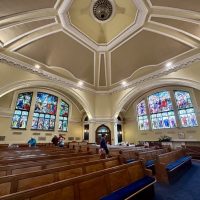Approach to Worship: Psalm 119:1-5
Hymn: For all the saints who from their labours rest (R&S 658)
Prayers of Approach
Blessed are those who set their hearts on God and hold fast to his word. Blessed are those who are faithful in prayer, and whose songs are of praise. Blessed are those who listen to the teachings of Scripture and live them out. Blessed are we as we gather together to worship in Jesus’ name – for he is here, he is among us. Amen.
As the Israelites listened to Moses, so we open our hearts to hear your word, O God. As the scribes listened to Jesus, so we open our hearts to hear his teaching, O God. We bring our lives to you: bless and shape them to your glory. Amen.
God of all time and all people, we thank you for your words that have been passed down through the ages – by Moses and the prophets, by Jesus and by your disciples and saints – words of wisdom, words of life, words of blessing. May we live out those words in lives of integrity, compassion and faithfulness, to your glory. Amen.
Reading: Deuteronomy 6:1-9
Introduction
There are 613 Laws in the Hebrew scriptures. Moses reminds the people of them as they prepare to enter the promised land, stressing the importance of the first, the ‘Shema’ (Hebrew for ‘hear’) which faithful Jews still recite every day. ‘Hear, O Israel… love the Lord your God with all your heart, with all your soul, and with all your strength.’ They are reminded that everything begins (and ends) with the love of God. For centuries Scribes and scholars have discussed and debated the Laws, their relative importance and what constitutes obedience of the whole Law so it comes as no surprise that scholars of Jesus’ time ask for his opinion as an acclaimed teacher.
Hymn: Lord I have made your word my choice (R&S 316)
Reading: Mark 12:28-34
Sermon/Reflection
A scribe, a Jewish teacher and lawyer (one who studies the Law), asks Jesus about the most important of God’s commandments given through Moses. Unlike other occasions when Jesus is asked questions by Jewish authority figures this is not a trick question. The Law was a keenly debated subject and although the straightforward answer to the question is universally acknowledged and accepted there is still room for debate over the nature of God’s commands and how to love God. The scribe was therefore genuinely interested in hearing Jesus’ views, his ‘take’ on the subject.
Jesus gives the ‘correct’ answer from the perspective of Jewish Scripture, but also offers an addition, giving a clear insight into what lies at the heart of his spiritual mission. The scribe takes Jesus’ answer to mean that love for God and neighbour is more important than Temple worship, and Jesus commends him for his wisdom, declaring that he is not far from the kingdom of God.
This might then raise the question ‘Who can come into the kingdom of God?’ So let’s take a look at how to, or who qualifies. Is it through some sort of initiation rite such as the secret rites of organisations like the Freemasons, or by investiture or a promise ceremony like the Scouts or Guides, or by paying a membership fee? It could be said that the church has initiation rites – baptism and confirmation – but does God require these in order for us to enter the kingdom?
Or perhaps it is by ‘signing up’ to a codified set of beliefs or a creed such as the Nicene or Apostles’ creeds (or in the Presbyterian tradition the Westminster Confession). Some churches operate quite tight ‘membership’ criteria: if you attend regularly then you will be expected to sign up for courses and be admitted into membership on profession of faith or personal testimony. Other churches seem to have no boundary at all between members and non-members.
Another way might be to suggest that our behaviour has something to do with it. Rather like Father Christmas with his list of children who have been naughty or good, only the good ones will get presents. Ministers often hear people assure them that, ‘When I’ve got my life sorted out, then I’ll come to church.’ It is a common belief that church is for ‘good’ people – and, consequently, those are the people who are welcome in God’s presence. That’s why so often Christians are accused of hypocrisy when we get things wrong and don’t live up to other people’s expectations. It’s interesting to note those who were welcomed into Jesus’ presence and who would not have been described as ‘good’.
Today’s readings seem to suggest that this third approach is closest to what God wants. However it is more than just behaviour; it is an attitude of mind and a way of life that is a relationship with God and with our fellow human beings built on love. It emphasises not so much our performance but our intention, the sincerity of our purpose. On the eve of ‘All Saints’ it might help us to answer the question, ‘Who can approach God’s presence, who can enter his kingdom?’ which isn’t so different to asking, ‘Who are the saints?’ – especially if the answer is ‘the company of those who love God and their neighbour – those who come humbly and sincerely to seek God’s face.’
According to a well-known Andrew Lloyd Webber song ‘love changes everything’. What does it mean to love someone ‘with all your heart’? How can you show your love for God, yourself, and for your neighbour this coming week?
Hymn: Seek ye first the kingdom of God (R&S 512)
Prayers of Intercession
Love God… and love your neighbour as you love yourself. Lord, we pray for those for whom the world seems lacking in love.
We pray for countries where poverty or conflict have taken away all hope and opportunity: where children have no hope of schooling; where families have no hope of secure housing; where adults have no hope of employment; where whole communities have no hope of peace.
We pray for our local community…
for those who find all doors are closed and all pathways blocked by prejudice; for those who work in this area to open opportunities for more people…
for those existing on the margins of our society.
for those who have lost a loved one; for those who face illness; for those whose dreams have been suddenly snatched away;
for those known to us who need support at this time…
We pray for our own lives – where we are not fulfilled – where we know our lives could be richer: in the decisions we have to make this week; in the responsibilities that we will bear this week; in the expectations people will have of us this week. Pause for reflection.
We are the saints whom God has called,
May we stand alongside all those who have gone before us,
May our daily living be part of the coming of the kingdom of God, where the earth is filled with the love of the Lord, and all dwell in plenty and in peace.
We offer these and all our prayers – those spoken out loud and those whispered in the quietness of our hearts – in the name of Jesus Christ our Lord.
Amen.
Hymn: God is love; his the care (R&S 274)
Blessing
Go, as saints of God, in the peace of Christ, with the words of God in your mind, with the love of your neighbour in your heart, and with the blessing of God on your life. Amen.
Prayers and other material (adapted) © ROOTs for Churches Ltd. Used by permission.








